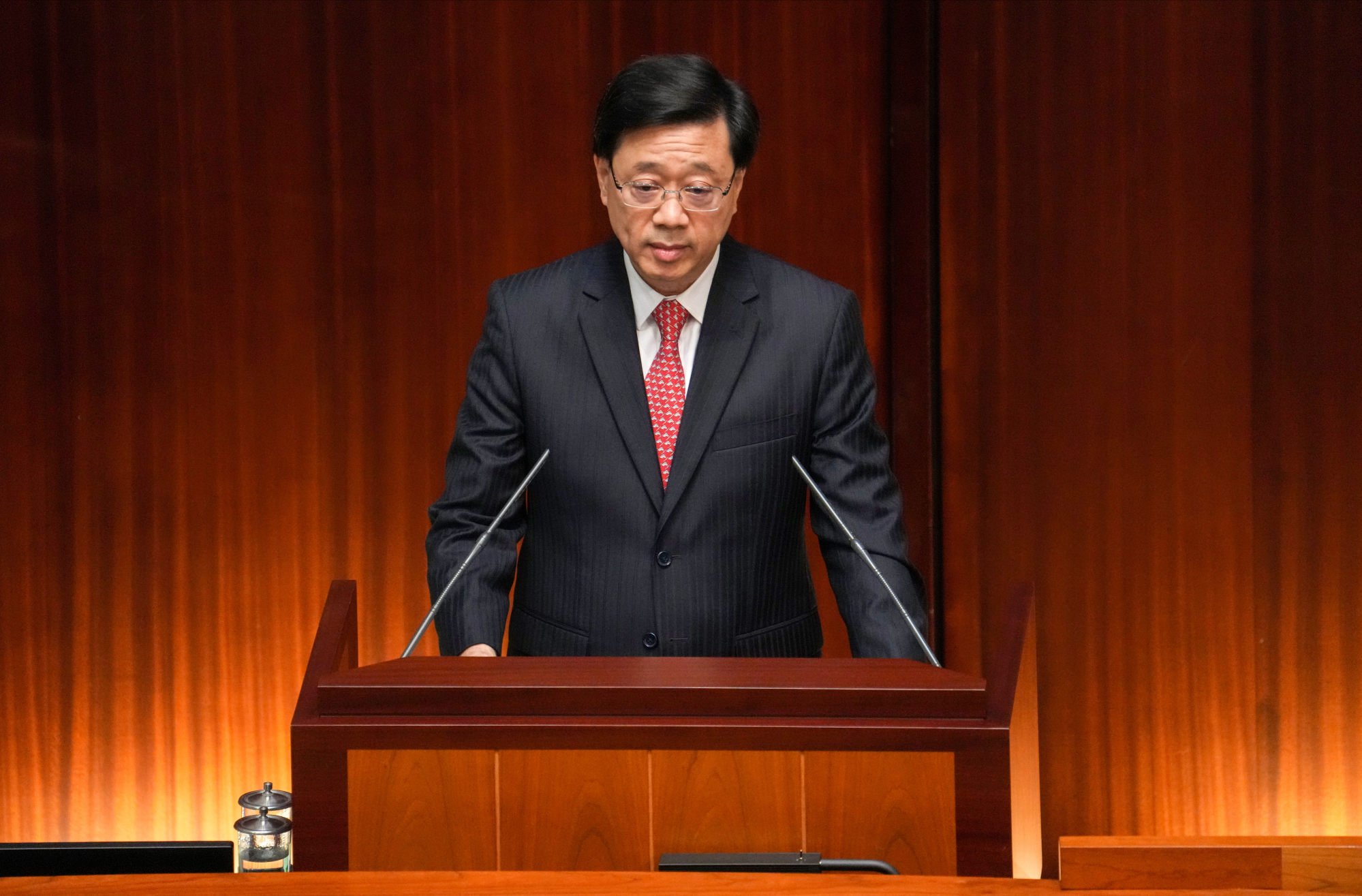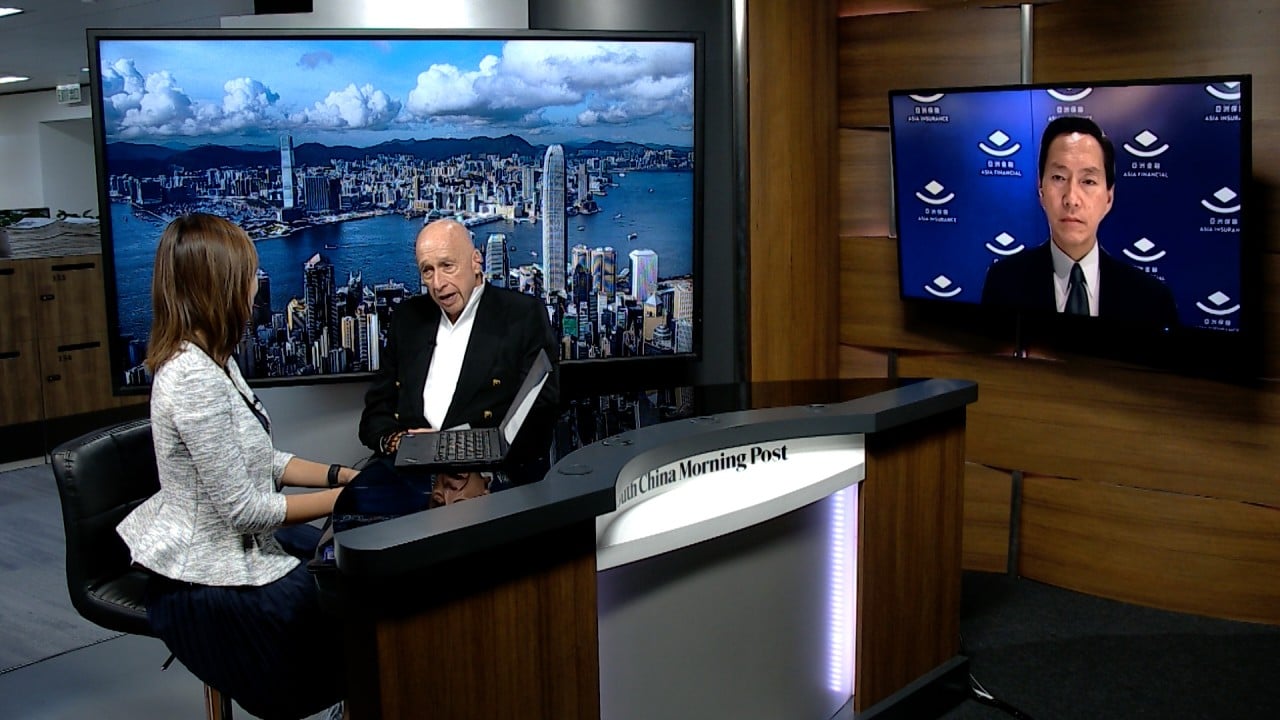
Hong Kong policy address: John Lee pledges to go all out to attract talent, build more homes and seize opportunities in ambitious governing blueprint
- Chief executive lays out his vision to ‘build a better Hong Kong’ after political and economic woes in nearly three-hour speech
- Lee pledges creation of two high-level bodies to attract overseas talent and companies to combat brain drain brought on by emigration wave
Hong Kong’s leader has unveiled an ambitious blueprint for the city’s makeover after years of political and economic turmoil, promising in his first policy address to go all out to attract talent and enterprises, build more affordable homes, improve healthcare, reform the governing system, and seize development opportunities.
Along with improving living conditions and ensuring social harmony, he promised to launch an aggressive global marketing campaign to promote the city’s comeback from two years of stringent Covid-19 border restrictions and the 2019 social unrest.
“With an intricate and volatile international political environment, certain external forces have been deliberately smearing our country and distorting the situation in Hong Kong,” he said.
“We have to present the true picture of Hong Kong to the world and promote our strengths, achievements and opportunities, and that the city is a good place where people can make their dreams come true.”

With many having left Hong Kong in an emigration wave that has created a brain drain, Lee acknowledged in his speech that the local workforce had shrunk by about 140,000 over the past two years. The city would seek reinforcements from both mainland China and overseas with the promise of sweeteners such as special visas and home-purchase tax concessions, he said.
As part of the drive, Lee announced the establishment of two high-level bodies led by his deputies, the Office for Attracting Strategic Enterprises and the Talents Service Unit, which would woo mainland and overseas enterprises, and formulate strategies to recruit talent, respectively.
Lee envisaged the city’s financial secretary as the “brain” heading what would be a one-stop shop to communicate with talent and investors, supported by the government’s economic and trade offices overseas which would act as the “limbs” to facilitate the push.
Among what he described as “exceptional” initiatives to lure talent, he announced a new Top Talent Pass Scheme under which a two-year visa would be granted to anyone earning at least HK$2.5 million (US$318,480) a year, or having graduated from the world’s top 100 universities and with at least three years of working experience.
Hong Kong policy address: no mention of ‘0+0’ among 5 directions in Covid fight
Employment visas would be extended to a maximum of three years, Lee said, while employers would be allowed to bring in staff from overseas without the need to prove difficulties in hiring locals for 13 professions facing manpower shortages. Other professions seeking to fill any position with an annual salary of HK$2 million or more would also be eligible.
Effective from Wednesday, foreigners who bought a home in Hong Kong would be entitled to extra-stamp duty refunds upon becoming permanent residents after living in the city for seven years, he added.
“We want talents to develop their roots in Hong Kong but at the same time we don’t encourage property speculation,” the chief executive explained later.
Lee denied that his new talent scheme was a copy of Singapore’s, cautioning against the frequent comparisons between the two cities.
“It’s fine if we hope to understand our own flaws and do better, but we should not belittle ourselves,” he said. “Hong Kong’s attractiveness is in our DNA.”
The chief executive also announced the setting up of the new Hong Kong Investments Corporation that would draw from fiscal reserves to promote the development of industries and the economy. A HK$30 billion Co-investment Fund, to be managed by the corporation, would attract enterprises to set up operations in Hong Kong, he said.
Lee promised to personally lead delegations of his principal officials overseas, with the first stop being the Apec summit in Thailand next month, followed by the “Think Business, Think Hong Kong” campaign by the Trade Development Council next year.
He announced that a task force, led by Financial Secretary Paul Chan Mo-po, would visit both traditional and emerging markets to rebuild the city’s image, while launching a new visitors’ programme which would invite 1,000 prominent political, business and media leaders from the mainland and overseas to visit the city on sponsorship to tell the “good stories of Hong Kong”.
Lee also set ambitious housing goals as part of improving living conditions, one of the items on the to-do list handed down by President Xi Jinping on July 1 when he was in the city to mark the 25th anniversary of its handover to Chinese rule. He acknowledged his policy blueprint was “guided” by Xi’s “important speech”, which also called on the local administration to improve governance, strengthen the momentum of development and uphold harmony and stability.
Arguing that Hong Kong needed “breakthroughs” to end its housing woes, Lee proposed building 30,000 new flats within the next five years under a new “Light Public Housing” scheme, which would simplify and speed up the supply of affordable homes.
He also made a bold pledge to shorten the waiting time for public housing from the current six years to 4½ years by 2026-2027, while increasing the overall production of public flats by about 50 per cent in the next five years.
On the public health front, learning from the hard lessons of Hong Kong’s battle with the pandemic, Lee underscored the need to overhaul the healthcare system and shift the focus from treatment to prevention. The transformation would be coordinated by a high-powered Primary Healthcare Authority to be established by 2024.
Asked if he had stacked too many items on his plate, Lee said: “It’s ambitious, but it’s realistic.”
Lee also laid out plans to improve the system of governance in terms of the decision-making structure, leadership roles, distribution of powers and responsibilities, and execution mechanisms.
Some 110 indicators would be set to ensure compliance with his “result-oriented” approach, he said, while the civil service code would be updated to build a strong awareness of safeguarding national sovereignty and security among the government workforce.
The “reward and punishment system” would be strengthened to recognise merit and weed out those who failed to make the grade, Lee added.
He highlighted Hong Kong’s obligation to safeguard national sovereignty, security and development interests as the top priority for the “one country, two systems” policy under which Hong Kong is governed.
He said his administration would press ahead with preparatory work for the enactment of a local security law, legislate for the regulation of online and offline crowdfunding activities and make laws to enhance cybersecurity for critical infrastructure.
Disappointment not an option in policy address debut by John Lee
As expected, the chief executive did not provide a timetable for lifting all pandemic restrictions, but reiterated that his administration would continue to “strike a balance between epidemic risks and economic needs”.
Health officials confirmed 5,124 coronavirus infections on Wednesday, including 390 imported ones, and reported 12 more related deaths.
The State Council’s Hong Kong and Macau Affairs Office in Beijing hailed Lee’s policy address for fully implementing the “one country, two systems” principle with precision, based on the list of “hopes” and “expectations” that President Xi had laid down.
New People’s Party lawmaker Lai Tung-kwok, formerly the city’s immigration and security chief, praised a “complete change in attitude” from the government in attracting foreign talent.
But Lo Kin-hei, chairman of the opposition Democratic Party, which has no seats in the current “patriots-only” legislature, said the government should nurture home-grown talent and enterprises, rather than recruiting from abroad.


